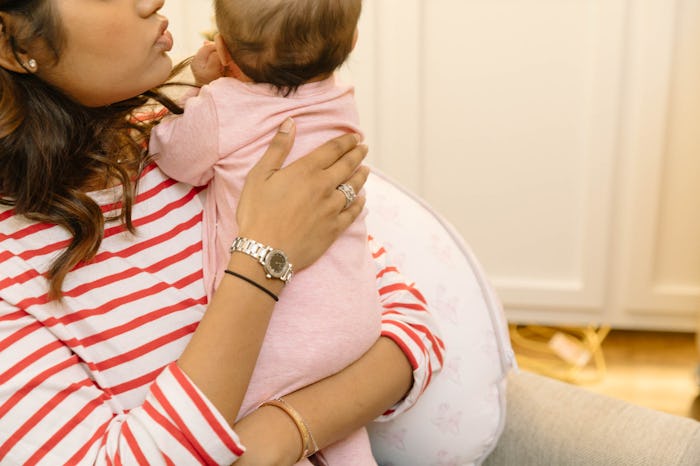Life
Here's How Long You Have To Wait To Kiss A Baby If You Have A Cold Sore
Cold sores are painful, unsightly, and, like many ailments, contagious. As a parent, you don't want to risk spreading anything to your child. You also don't want to miss out on those goodnight kisses. (I mean, have to tried to resist smooching your baby's chubby cheeks? Almost impossible.) So in addition to know how to treat your cold sore — and do it quickly — you also want to know how long you should wait to kiss your baby if you have a cold sore.
According to Healthline, cold sores are tiny fluid-filled blisters caused by the HSV-1 and HSV-2 strains of the herpes virus. In general, they're not dangerous and typically go away on their own after a few weeks. They are, however, highly contagious and spread through physical contact like kissing or touching the infected area. They usually spread from adult to adult, but it is possible for a baby or child to contract a cold sore.
Although they're usually just an annoying bother for adults that will recur from time to time, Baby Center noted that cold sores can be dangerous for young babies. The sores themselves aren't dangerous, though they can be painful and uncomfortable. Both adults and babies can experience fevers, soreness, sore throat and mouth soreness along with the blister. For babies though, the danger lies in the virus potentially spreading to other areas of their body. Babies in their first three or four weeks of life are most at risk for developing severe symptoms, the article noted.
It isn't common for babies under 6 months to get a cold sore, but if you or someone you know has a cold sore, it's very important to know how to keep your baby safe. The aforementioned Healthline article noted that moms who have cold sores don't need to isolate themselves from their babies, however, they should ensure that they don't kiss their baby until the sore is scabbed over and dry. At this point, the sore is no longer contagious.
Until the sore is no longer contagious, it's important that anyone with a cold sore keeps their sore covered around a baby, refrains from kissing the baby or touching their sore, and washes their hands frequently. If your baby develops a cold sore with a fever, be sure to contact your doctor right away to make sure anti-viral medication isn't necessary.
